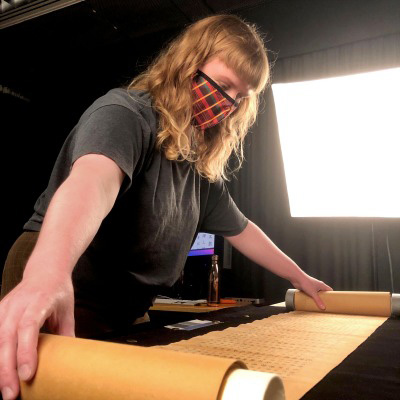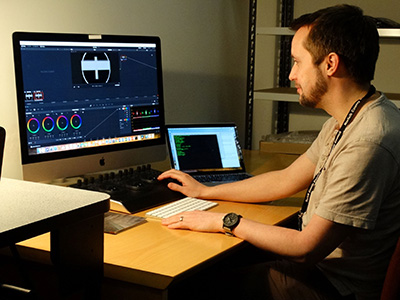Since 2018, The National Archives’ Bridging the Digital Gap programme has created 24 technical traineeships that bring new talent with much-needed technological skills into the archives sector. Supported by the National Lottery Heritage Fund, the programme places trainees in archives across England on a 15-month secondment. The first cohort of trainees finished in January 2020. This month, we caught up with two of them to find out how their traineeships helped them in their new careers.
‘My traineeship at University College London (UCL) Special Collections was an excellent opportunity to gain real experience of working in an archive,’ Isabelle Reynolds-Logue says. ‘I worked on various tasks, including digitisation, cataloguing and conservation, which gave me a good overview of the different types of jobs available. I had the freedom to explore different aspects of archival work to find what I enjoy most. I realised that digitisation was my favourite part – it is so important to the preservation of the material.’
Isabelle is now a Senior Imaging Technician on the Lotus Sutra Manuscripts Digitisation Project at the British Library. ‘The digitisation skills I developed during the traineeship have been very useful,’ she says, ‘and I have built upon them in my work now.’

The Lotus Sutra project involves 800 scrolls dating from the 5th to the 10th centuries, which were discovered in a Buddhist cave in China in 1907. ‘Most of them have remained untouched since they were found. Only now are they being conserved and digitised. It is quite amazing to be handling something few others have seen before,’ Isabelle says. ‘Because the scrolls must be photographed in sections, the digitisation process also requires us to digitally “stitch” them back together, which is very different to standard cultural heritage digitisation.’
In addition to the scrolls, Isabelle has digitised medieval English manuscripts and Javanese manuscripts from the 17th to the 19th centuries. ‘I am still shocked at the age of the material I work with,’ she says. ‘It is so easy to get used to working with historic material that sometimes you forget what you’re actually touching! I enjoy the challenges that the items present during digitisation, as well as working to preserve them.’
Isabelle finds that she uses other aspects of the traineeship in her current job too. ‘At UCL, I spent time doing conservation work, which is useful now in assessing items. I have also drawn on the general understanding of cultural heritage and archival processes that I gained. My knowledge of digital archiving is proving useful when it comes to discussing with colleagues the best way to look after our digital files.’
Since finishing his traineeship at the East Anglian Film Archive (EAFA), Michael Norman has been the Data Specialist on the Heritage 2022 Video Digitisation Project at the British Film Institute (BFI). ‘The digital skills I developed in a leading regional film archive have been invaluable in helping me transition to working in the national moving image archive of the UK,’ Michael says.

‘At the BFI, I support the preservation of digital files created from the digitisation of 100,000 at-risk titles on videotape – stewarding them through various delivery, validation, documentation, preservation and supply workflows. This role has provided numerous opportunities to implement and build upon the skills I gained during the traineeship at EAFA.’
‘The digital files I work with are captured from videotape, which is now an obsolete format. The magnetic tape degrades over time and the playback equipment is nearly extinct. By digitising the tape and carrying out ongoing preservation on the resultant file, we are keeping alive the essence of the moments captured in the original recordings and making them available for viewing. It is endlessly rewarding – and a privilege – to be able to contribute in a small way to the preservation of these historical materials.’
Reflecting on the benefits of training in digital archiving, Michael says, ‘I believe that for the archive sector to continue thriving, we need to nurture technical skills, rather than persevere with the academic route as the sole requirement for new professionals. Maintaining a digital archive requires different skills.’
‘It is often said that digital preservation is an ongoing process. Similarly, the sector cannot afford to stand still. Archives must continue to be at the forefront of developments, creating technological solutions to archive-specific needs to ensure the long-term preservation of our digital heritage.’
Isabelle and Michael are among several other trainees from the first two cohorts of the Bridging the Digital Gap programme who are now employed in the sector. The others are working at Cambridge University Library’s Digital Content Unit, East Riding Archives, The National Archives, the Archives and Special Collections Centre of University of the Arts London, and West Yorkshire Archive Service. Look out for future blogs where we’ll hear from some of them about their new careers.
Chris Jones is the Bridging the Digital Gap Project Manager.